(The Center Square) – An estimated 425 Maricopa County residents are expected to benefit from the government’s $500,000 taxpayer funding for the Sustainable Home Improvement Loans of Arizona.
The loans are specifically meant for those seeking housing improvements as it relates to energy, such as HVAC, according to a news release from the county. In total, the funds are meant to supplement SHILA’s $5 million overall efforts in the area for the next three years.
“We are honored to receive this foundational investment from the Maricopa County Industrial Development Authority,” Ty Lorts, CEO of SHILA, said in a statement. “With their support, we can start making home improvement financing accessible for families who need it most. This funding will allow SHILA to begin transforming homes across Maricopa County, helping residents access a healthier living environment, lower utility bills, and have a greater quality of life.”
Maricopa County Supervisor Clint Hickman said the funding will help members of the community get the help they need for their homes.
“By investing in SHILA, we are helping low- and moderate-income homeowners access affordable financing options for energy-efficient improvements that will lower their utility bills, renovate their homes, and improve their overall quality of life,” Hickman stated.
“This partnership not only strengthens our local economy but also contributes to a more resilient and sustainable future for Maricopa County. We are excited to support SHILA’s work and the positive impact it will have in our community,” he added.
According to the organization’s website, SHILA is a nonprofit that provides unsecured loans and does not conduct a credit check, stating that “approval is based on ability to re-pay, not credit scores.” While it is likely aimed at helping those with low and moderate incomes, the organization’s website notes that there is no technical income cap for people to see if they can get financing, but there is a checklist to qualify.
In addition to “energy efficiency” lending, the group also helps with “disability-related enhancements” for homes. Contractors have to fill out an application to be “approved” by the nonprofit.






